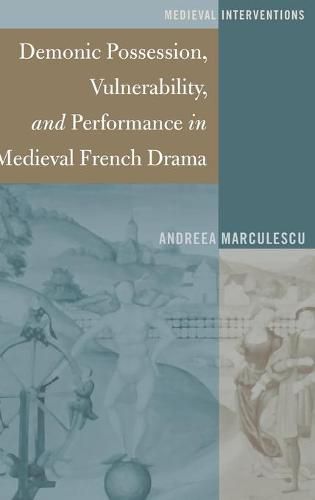Readings Newsletter
Become a Readings Member to make your shopping experience even easier.
Sign in or sign up for free!
You’re not far away from qualifying for FREE standard shipping within Australia
You’ve qualified for FREE standard shipping within Australia
The cart is loading…






This title is printed to order. This book may have been self-published. If so, we cannot guarantee the quality of the content. In the main most books will have gone through the editing process however some may not. We therefore suggest that you be aware of this before ordering this book. If in doubt check either the author or publisher’s details as we are unable to accept any returns unless they are faulty. Please contact us if you have any questions.
Just like the modern hysteric, a figure that catalyzes clinical vocabularies confirming medieval theological anxieties, the demoniac has been considered an anomalous and abnormal manifestation of womanhood. Incapable of self-governance, both linguistic and corporeal, the medieval possessed is placed in the category of the pathological. The symptoms of possession are part of a multilayered discourse coined by medieval theologians, authors of exempla, hagiographers, and natural philosophers. The subjectivity of the demoniac becomes, thus, a fetishistic construction which allows medieval male intellectuals to ponder questions about demons, the supernatural, and the human body. Demonic Possession, Vulnerability, and Performance in Medieval French Drama advocates for an affective and ethical framework of reading the vocabularies of possession in which the demoniac’s convulsions, contortions, shrieks of pain, and snapshots of disarticulated language are not conceptualized as pathological but as a model of intercorporeality built around modalities of sensuous exchange between the bodies of both the possessed and of those whom she comes in contact with. Can we think of a corporeal agency of the anomalous body of the possessed independent of reason and articulated language? What happens when such distorted bodies enter zones of visual, haptic, and aural contact with abled-bodied individuals? Can possession be considered as a producer of a sensuous type of knowledge that alters the way sovereign subjects perceive themselves? Taking as primary sources a series of late-medieval French Passion Plays and hagiographical plays authored by poetic and religious figures such as Arnoul Greban, Andre de la Vigne, Eustache Mercade, and Jean Michel, this book argues that the lyrical capaciousness of the plays as forms of narrativized poetics allows us to understand demonic possession as a series of bodily narratives of pain, of healing, of witnessing, and, ultimately, of vulnerability.
$9.00 standard shipping within Australia
FREE standard shipping within Australia for orders over $100.00
Express & International shipping calculated at checkout
This title is printed to order. This book may have been self-published. If so, we cannot guarantee the quality of the content. In the main most books will have gone through the editing process however some may not. We therefore suggest that you be aware of this before ordering this book. If in doubt check either the author or publisher’s details as we are unable to accept any returns unless they are faulty. Please contact us if you have any questions.
Just like the modern hysteric, a figure that catalyzes clinical vocabularies confirming medieval theological anxieties, the demoniac has been considered an anomalous and abnormal manifestation of womanhood. Incapable of self-governance, both linguistic and corporeal, the medieval possessed is placed in the category of the pathological. The symptoms of possession are part of a multilayered discourse coined by medieval theologians, authors of exempla, hagiographers, and natural philosophers. The subjectivity of the demoniac becomes, thus, a fetishistic construction which allows medieval male intellectuals to ponder questions about demons, the supernatural, and the human body. Demonic Possession, Vulnerability, and Performance in Medieval French Drama advocates for an affective and ethical framework of reading the vocabularies of possession in which the demoniac’s convulsions, contortions, shrieks of pain, and snapshots of disarticulated language are not conceptualized as pathological but as a model of intercorporeality built around modalities of sensuous exchange between the bodies of both the possessed and of those whom she comes in contact with. Can we think of a corporeal agency of the anomalous body of the possessed independent of reason and articulated language? What happens when such distorted bodies enter zones of visual, haptic, and aural contact with abled-bodied individuals? Can possession be considered as a producer of a sensuous type of knowledge that alters the way sovereign subjects perceive themselves? Taking as primary sources a series of late-medieval French Passion Plays and hagiographical plays authored by poetic and religious figures such as Arnoul Greban, Andre de la Vigne, Eustache Mercade, and Jean Michel, this book argues that the lyrical capaciousness of the plays as forms of narrativized poetics allows us to understand demonic possession as a series of bodily narratives of pain, of healing, of witnessing, and, ultimately, of vulnerability.